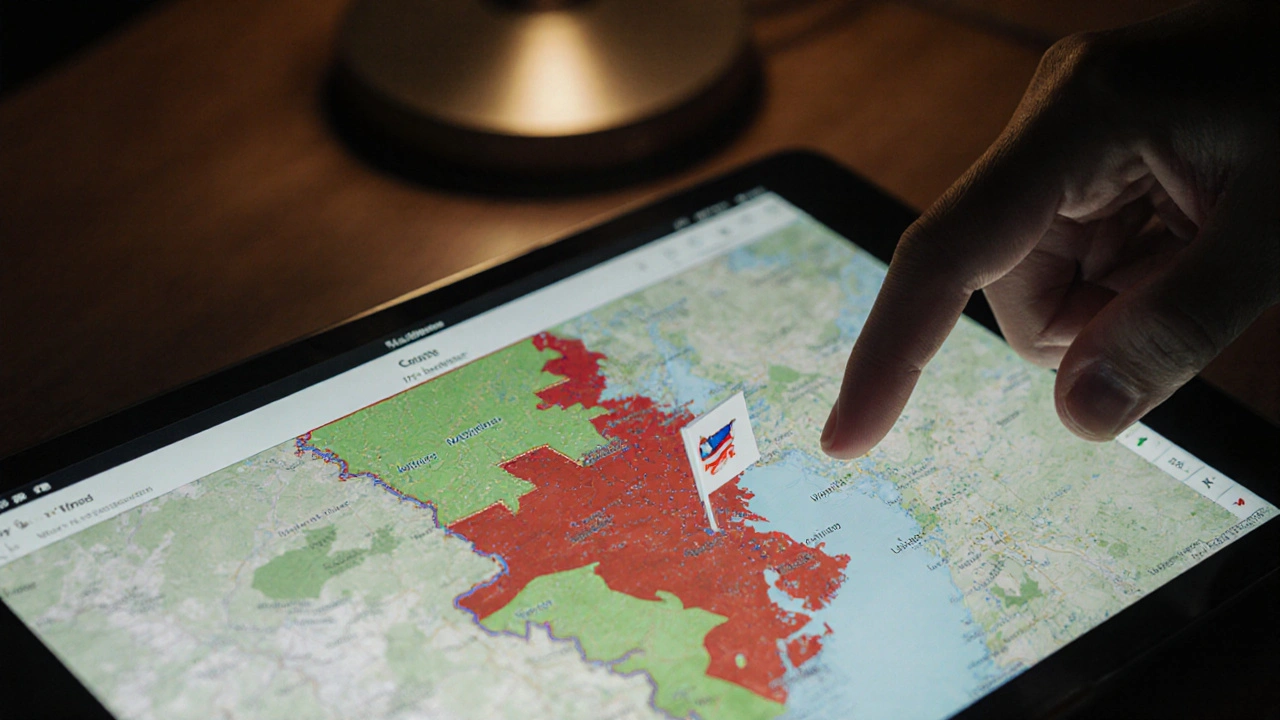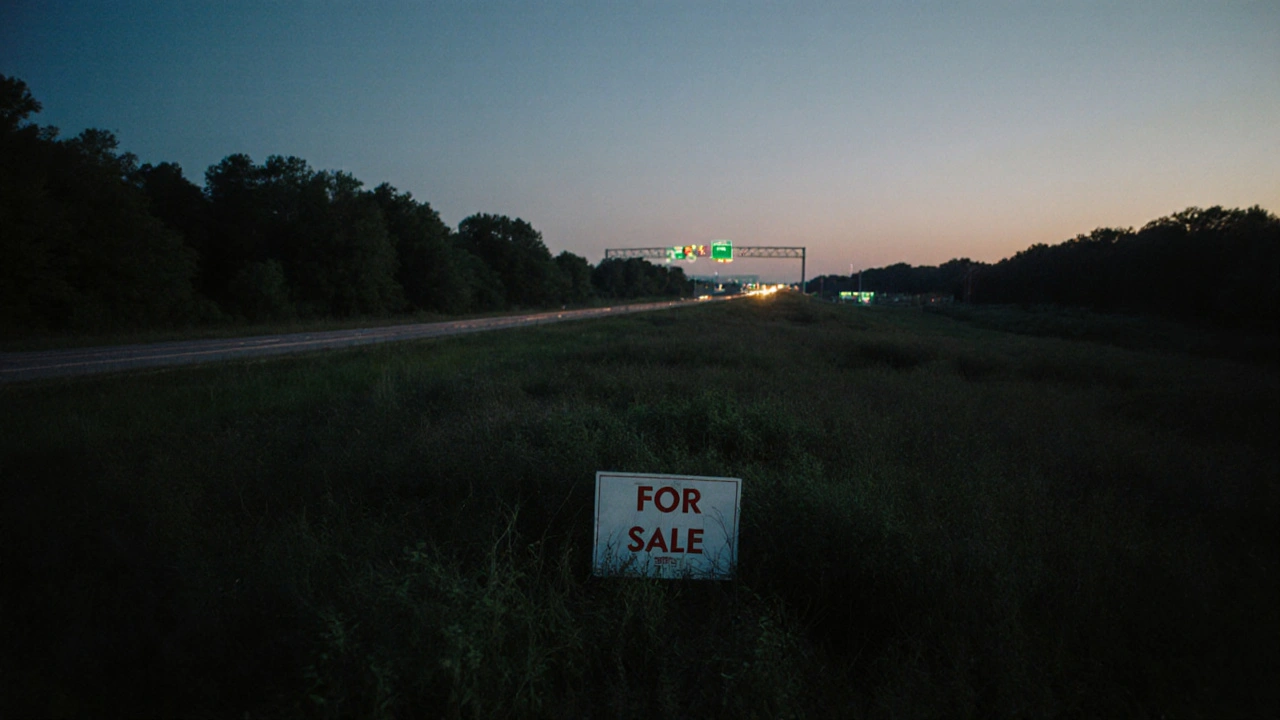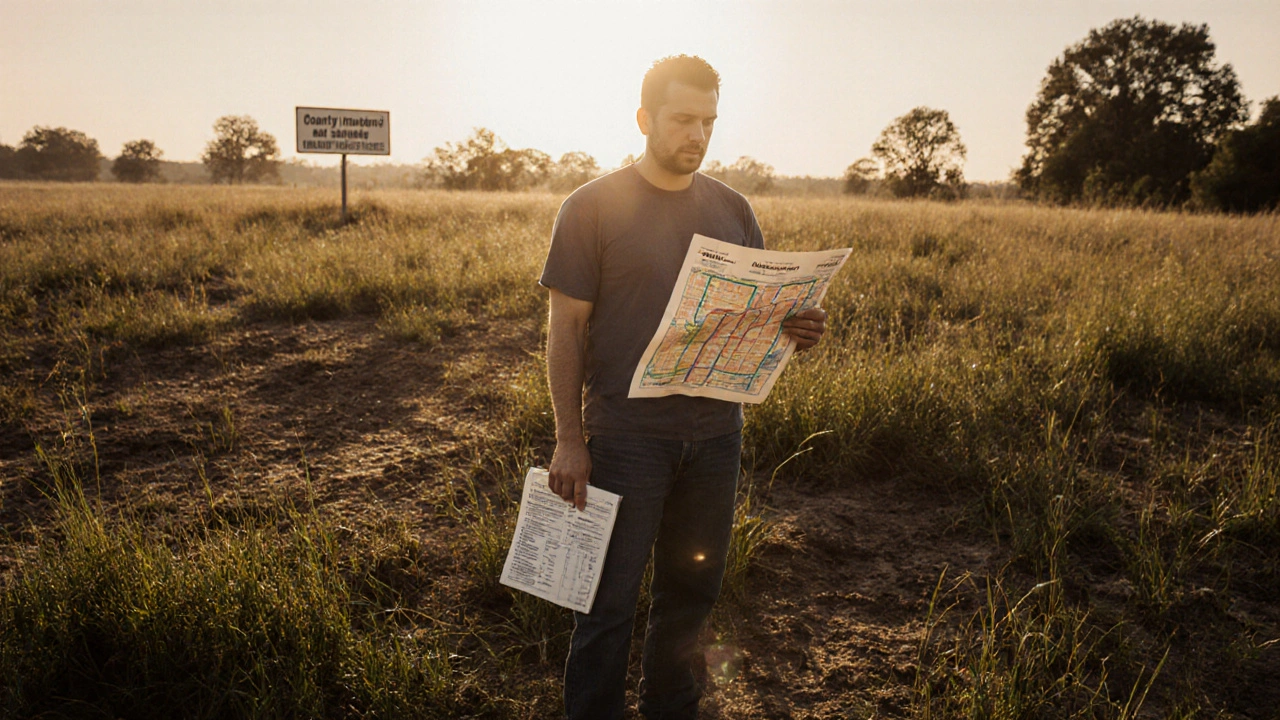Buying land isn’t like buying a house. There’s no kitchen to inspect, no roof to check, no plumbing to test. Just dirt, trees, and a lot of questions. And if you’re thinking about investing in real estate land, you’re stepping into a world where the rules are different, the risks are higher, and the payoffs can be huge-if you know what you’re doing.
What Exactly Are You Buying?
When you buy land, you’re not just buying space. You’re buying rights. Rights to build. Rights to drill. Rights to farm. Rights to sell later. And those rights are locked down by something called zoning.
Zoning laws vary by county, city, and even neighborhood. A plot labeled "residential" might let you build a single-family home, but not a duplex. A "rural" zone might allow you to keep horses but ban cell towers. Some areas have "agricultural" zoning that restricts development for decades. You can’t assume anything. You have to check the official zoning map from your local planning department. Don’t trust a realtor’s word. Go to the county website, pull the parcel number, and read the code yourself.
One client in Georgia bought 10 acres thinking it was buildable. Turns out, it was in a floodplain with a 100-year restriction. No foundation allowed. He lost $85,000 before he even broke ground.
Utilities: The Hidden Cost
No house? No problem. Except when you realize there’s no water, no sewer, no electricity. That’s the reality with most raw land.
If the property is in a rural area, you’ll likely need a well and a septic system. Drilling a well can cost $5,000 to $20,000 depending on depth and rock. A septic system? Another $10,000 to $25,000. And both require permits and soil tests. Many people skip the soil test-big mistake. If the ground doesn’t drain, your septic tank will back up. And fixing it later? That’s a $50,000 problem.
Electricity? If power lines aren’t already running to the edge of your land, you’re looking at $15,000 to $50,000 just to get a pole installed. Some utilities charge per foot. One buyer in Tennessee paid $38,000 to get 1,200 feet of line run from the nearest transformer.
And don’t forget internet. Fiber? Forget it. Most rural land has satellite or fixed wireless. Speeds under 10 Mbps. Streaming Netflix? Good luck.
Access: Can You Even Get There?
Landlocked property is a nightmare. If your parcel doesn’t have direct access to a public road, you might need an easement. That means negotiating with a neighbor to let you cross their land to reach yours.
Some easements are written into the deed. Others are verbal-or worse, assumed. I’ve seen people buy land, build a cabin, then get sued because the neighbor says, "I never agreed to let you drive over my pasture." Courts don’t care about your story. They care about paperwork.
Always verify legal access. Look for a recorded easement on the title report. If it’s not there, walk the property line. If you have to cross someone else’s land to get to your own, you don’t own the access. You’re borrowing it. And they can take it away.

Environmental Restrictions
Before you even think about building, check for environmental red flags.
Wetlands? Protected. Endangered species habitat? Protected. Archaeological sites? Protected. You can’t build on them. And if you accidentally disturb one, you could face fines in the six figures.
The EPA and state agencies have online databases where you can search by parcel number. In many states, you can even download a GIS map that shows flood zones, wetlands, and protected areas. Use it. Don’t skip it.
One investor in Florida bought 5 acres near a river. He planned to build a vacation home. A month after closing, the state sent a notice: the property overlapped a protected mangrove buffer zone. He had to remove his survey stakes. No construction allowed. Ever.
Land Use Potential: What Can You Actually Do?
Land isn’t just for building homes. It can be farmed, mined, leased for solar panels, rented for storage, or even sold in parcels later. But your potential return depends entirely on what the law allows.
Some counties allow short-term rentals on raw land if you have a permit. Others ban them completely. Some allow cell towers for $5,000 a month in rent. Others require a special variance.
Here’s a simple way to think about it: real estate land is an asset class. It’s not a home. It’s a blank canvas with legal boundaries. Your job is to figure out what the canvas can become.
Ask yourself: Can I build? Can I rent? Can I sell later? Can I hold for 10 years? If you can’t answer those clearly, walk away.

How to Find Good Land Deals
Most land deals aren’t listed on Zillow. They’re off-market. Sellers don’t want to pay listing fees. They want cash, fast.
Here’s how to find them:
- Visit the county tax assessor’s website. Look for parcels with low assessed values and high ownership turnover.
- Search for properties with "tax delinquent" status. These owners are desperate to sell.
- Drive rural roads. Look for "For Sale by Owner" signs. Call the number.
- Join local Facebook groups for land buyers. People post deals there all the time.
- Work with a land specialist-not a regular realtor. They know the zoning, the utilities, the hidden traps.
One buyer in Missouri found a 20-acre parcel for $18,000. It was tax delinquent. The owner had passed away. The heirs didn’t want it. He closed in 45 days. Two years later, he sold half of it for $120,000 after getting zoning changed to allow tiny homes.
When Not to Buy Land
Not every piece of dirt is worth owning. Here’s when to say no:
- Land with no legal access
- Land in a flood zone with no insurance option
- Land with restrictive covenants that ban building for 20+ years
- Land where the soil won’t support a septic system
- Land you can’t even drive to without permission
- Land where the seller won’t let you do a soil test or well drill test
If any of these apply, walk away. No matter how cheap it looks.
Final Tip: Think Long-Term
Land doesn’t appreciate like houses. It doesn’t generate rent unless you build on it. But it can be one of the most powerful assets if you play it right.
Hold it. Wait for zoning changes. Wait for infrastructure to come in. Wait for demand to rise. One parcel near Austin, Texas, sold for $3,000 an acre in 2015. By 2024, it was $120,000 an acre because a new highway exit opened nearby.
But that only happened because the owner didn’t rush. He held. He waited. He paid the taxes. He didn’t try to build too soon.
Real estate land isn’t for quick flips. It’s for patience. For research. For understanding the invisible rules that most people never learn.
If you’re ready to dig in, start with the county records. Don’t buy a single acre until you’ve read the zoning code, checked the soil, confirmed access, and verified utilities. Everything else is just noise.
Can you build a house on raw land?
Yes, but only if the land is zoned for residential use, passes soil and drainage tests, has legal access, and has utility connections-or the budget to install them. Many people assume they can build anywhere, but zoning laws and environmental restrictions often prevent it.
Is buying land a good investment?
It can be, but only if you understand the risks. Land doesn’t generate income until it’s developed. Appreciation is slow and depends on infrastructure growth, zoning changes, and demand. Many land buyers lose money because they underestimate development costs or overestimate resale value.
How do I check if land is buildable?
Contact your local planning or zoning office. Request the parcel’s zoning classification. Ask for a copy of the subdivision and development code. Then, hire a soil engineer to perform a percolation test for septic systems and a survey to confirm boundaries and access. Don’t skip these steps.
What’s the difference between rural and residential land?
Rural land typically allows low-density uses like farming, ranching, or single homes on large lots. Residential land is meant for neighborhoods with multiple homes, often with stricter rules on lot size, setbacks, and utilities. Rural land usually has fewer services and longer wait times for infrastructure.
Do I need a real estate agent to buy land?
You don’t need one, but you should work with a land specialist. General real estate agents often don’t understand zoning, easements, or utility costs. A land expert knows where to find off-market deals and how to avoid hidden traps like environmental restrictions or access issues.

13 Responses
Land isn't a house. It's a legal puzzle with a side of bankruptcy. I've seen guys spend $200k on "prime" acreage only to find out the county won't let them put a shed on it. No well. No power. No access. Just a deed and a dream. Walk away before you cry over dirt.
They don't tell you about the FEMA maps. Or how the EPA can come in and slap a conservation easement on your land after you buy it. They're hiding it. All of it. The government, the realtors, the banks. You think you're buying land? You're signing a contract with a system designed to trap you.
It's not just about zoning. It's about morality. People who buy land without checking for wetlands or endangered species are basically saying, "I don't care what happens to nature." That's not an investment. That's a crime against the earth. And one day, we'll all pay for it.
Well said on the access issue. I once helped a client in Donegal who bought 12 acres with no recorded easement. Turned out the neighbor had been letting them use a dirt track for 30 years. When the new owner moved in, he blocked it. Took two years and €40k in legal fees to get a court-ordered easement. Always check the title. Always.
bro i bought a 5 acre plot in kerala for 2.5lakh and then found out the soil was all clay and the well drilled 150ft and still no water and the septic tank was like a swamp and the guy who sold it was like oh u shouldve checked but i thought it was like the videos on youtube u know and now i just sit there with my dogs and wonder what i did wrong lol
It's easy to get discouraged, but land is still one of the purest forms of wealth. You're not just buying dirt-you're buying time. Time for growth. Time for change. Time for things you can't even imagine yet. Hold on. Wait. The right moment will come.
Legal access is non-negotiable. Without a recorded easement, ownership is illusory. The burden of proof lies with the purchaser. Due diligence is not optional. It is the foundation of any land transaction. Negligence here is financial suicide.
Just check the county site. Look at the map. Call them. Don't trust no one. I did. Lost money. Learned. Now I check everything first. Simple.
bro... i just bought 20 acres in the middle of nowhere... no road... no power... no water... and i'm like... this is it... this is my freedom... the birds... the silence... the stars... no neighbors... no noise... no rules... i'm gonna build a cabin outta reclaimed wood and live off the grid and meditate every morning... the world can wait...
You think you're smart for buying land? You're just another sucker who thinks the government gives a damn about your "investment." They'll rezone it, flood it, tax it, restrict it, and then charge you $12k to get a permit to dig a hole. You're not buying land-you're buying a lawsuit with a view.
Land is the only asset that remembers. It remembers the droughts. It remembers the wars. It remembers the hands that tilled it before you were born. To own land is to enter a conversation older than money, older than law, older than the idea of ownership itself. You are not a buyer. You are a steward. And most of you? You're not ready for the weight of that.
While the article provides a comprehensive overview, I would emphasize the importance of consulting with a land use attorney before any transaction. Zoning laws are often subject to interpretation, and a single clause can render a parcel unusable. Professional guidance is not an expense-it is an insurance policy against catastrophic loss.
Most of you have no idea what you're talking about. In India, land is sacred. You don't buy it like a commodity. You inherit it, you honor it. You don't drill wells on ancestral soil without a priest's blessing. You don't cut trees without offering prayers. You think your septic tank matters? Your soul matters more. This Western obsession with permits and surveys is arrogance dressed as pragmatism. You don't own land. You're just borrowing it from your ancestors.